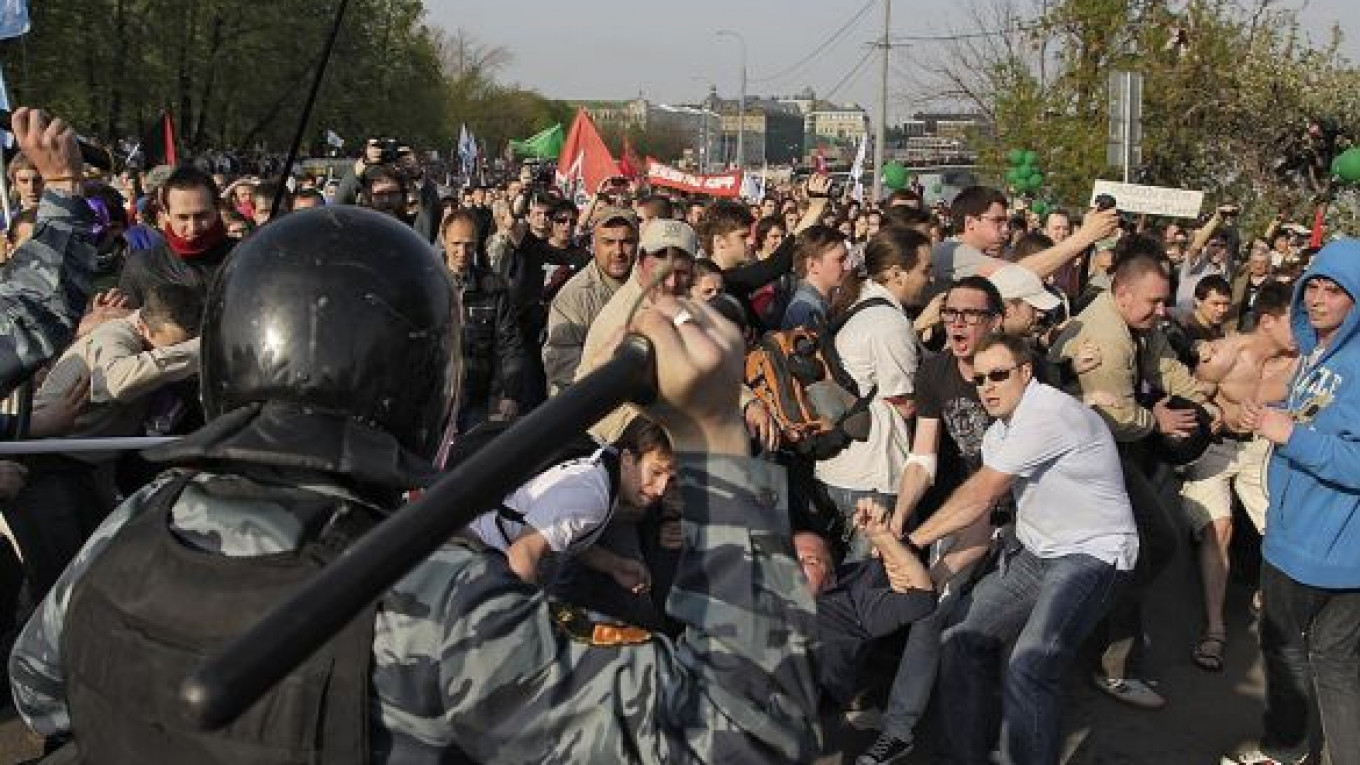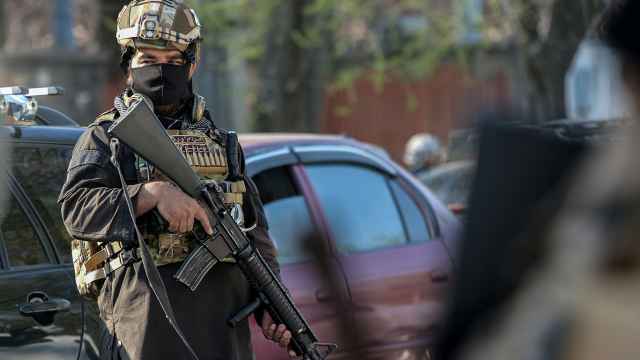When a judge delivers a verdict Friday in the high-profile Bolotnoye case, the defendants' cage will contain eight people. It might have held dozens more if some of the potential suspects had not fled abroad, fearing unfair prosecution in what many observers call a politically motivated trial aimed at repressing dissent.
The sprawling investigation, which stems from violence that broke out between protesters and police at a city-sanctioned opposition rally on May 6, 2012, originally had 29 suspects along with dozens of other potential targets. Of the 29 people who were charged, three have been convicted, 14 are being held in detention, and 11 have been granted amnesty in connection with the far-reaching measure initiated by President Vladimir Putin late last year. A verdict is expected to be announced against eight of the suspects on Friday.
In justifying the case, Putin and other high-ranking officials have argued that people who commit violence against security officers must be punished. Opposition supporters counter that they believe it was the authorities who provoked the clashes on Bolotnaya Ploshchad and say that the police should be prosecuted, for allegedly assaulting innocent people.
As the case expanded, investigators began interviewing more and more of the thousands of people who attended the May 6 demonstration, and some who thought they could be hit with charges decided to take themselves beyond the reach of the Russian security apparatus.
Filipp Galtsov, an activist with the Russian Socialist Movement, a far-left opposition group, was one of those targeted by investigators. He said that Federal Security Service officers had hinted that he could be accused of breaking through a police cordon on Bolotnaya Ploshchad on May 6, 2012.
"For me, it was a day when the authorities simultaneously got scared and demonstrated their inability to negotiate," Galtsov said about the date of the fateful protest.
Fearing for his safety, Galtsov traveled to Belarus in June 2012, despite the country's close ties to Russia and its reputation as authoritarian, he was able to hide there easily because Russians can stay in Belarus without a visa.
After about four months, he returned to Russia, feeling that the chances of being arrested had gone down. He turned out to be wrong.
In a story similar to that of Bolotnoye case suspect Leonid Razvozzhayev, Galtsov said he was "abducted" and beaten by police, then handed over to the powerful Investigative Committee, whose investigators tried to extract testimony from him against Razvozzhayev and fellow suspects Sergei Udaltsov and Konstantin Lebedev. An Interior Ministry spokesman said by phone Tuesday that he had no information on whether any complaints about police officers using violence against Galtsov had been filed.
Following the interrogations, Galtsov managed to leave Russia again in January 2013, heading this time for Ukraine because, like Belarus, it has a visa-free regime with Russia. But officials from Ukraine's migration service asked the same questions as Russian investigators, and then the country's security service tried to arrest him, citing an extradition request from Russia, Galtsov said.
Coming to his rescue were employees of the International Organization for Migration, which prevented the arrest. With the subsequent help of the United Nations Refugee Agency, Galtsov emigrated to Sweden in August 2013.
Oddly enough, the problems did not end when Galtsov arrived in the famously liberal Nordic nation. He was told by airport employees that he was suspected of being an "international terrorist" and transferred to a deportation facility. But five days later, Sweden's migration service apologized for the mistake and Galtsov was released. He was granted political asylum earlier this month.
"Here I get welfare, which is enough to cover expenses," Galtsov said via instant message earlier this month. "For leisure, I am learning the Swedish language and Swedish history."
Supporters of the Bolotnoye case suspects marching earlier this month.
Dozens Abroad
The total number of people who have emigrated over fears of being prosecuted in connection with the Bolotnoye case is unclear, but most estimate that it is over 20. In April 2013, Solidarity activist and opposition leader Ilya Yashin estimated the total number at 50, while Galtsov said he thought 20 to 30 people had emigrated.
Prominent emigres linked to the Bolotnoye case include Alexei Devyatkin, an activist with the Other Russia party, and his wife Jenny, who moved to Finland; Solidarity member Mikhail Maglov, who left for Ukraine; LGBT activist Alexei Kiselyov, who went to Spain; Pavel Yelizarov, a leader of the liberal RPR-Parnas party, who went to Mozambique; and Vsevolod Chernozub, a member of the December 5 Party, who emigrated to Lithuania.
Another person to have fled Russia over the case, left-wing opposition activist Alexei Sakhnin, put the number of those who left the country at 30 to 40.
Like Galtsov, Sakhnin also settled on Sweden as his destination, where he too was given safe haven earlier this month. A leader of the communist Left Front group, Sakhnin was the organizer of a column at the march down Ulitsa Bolshaya Yakimanka toward Bolotnaya Ploshchad on May 6, 2012. He said his role in the march could have been used as a pretext for charging him with "plotting riots" on the square together with Udaltsov.
"On May 7, 2013, my lawyer called me and said he had had an informal conversation with investigators and found out that they would issue an arrest warrant for me," Sakhnin said by phone. "It would have been a point of no return if I had been arrested. My comrades told me I would be more useful if I were free."
Sakhnin said Sweden was a logical choice for him because the country has a strong left-wing movement and an extensive welfare program, and is "logistically" close to Russia. While there, he has continued to work for Left Front and is cooperating with local socialist parties.
He said Sweden's migration service has had a neutral attitude toward him, while higher authorities have not paid him much attention. "I once met the Swedish prime minister in the street and said hi, but he did not respond," he said.
A Wider Trend
The asylum-seekers involved in the Bolotnoye case are part of a much larger wave of Russians fleeing what they perceive as political persecution. In 2012, 24,280 Russians sought political asylum in EU countries, ranking second behind Afghanis.
Among others, these include people linked to the case against the now-defunct oil company Yukos, people who participated in protests against the construction of a highway through the Khimki Forest near Moscow, and those fearing persecution in the North Caucasus republics.
Sergei Guriyev, who headed Moscow's New Economic School from 2004 until 2013 and helped transform it into a modern university, is one of the most prominent figures to have left Russia recently. He emigrated to France in April 2013 after being repeatedly questioned by the Investigative Committee as part of a possible third criminal case involving Yukos, which many believe to be politically motivated.
"I have differences with the regime that I have discussed many times in my interviews and op-eds," Guriyev said in an e-mail exchange. "Yet, I thought that these differences were compatible with my work at the New Economic School — which I believed to be very important and continued up until staying in Russia become too dangerous for me."
Guriyev dismisses criticism by some opposition supporters who say he overestimated the risk of being arrested.
"I have not heard such criticism from anybody who has actually ever been to prison," he said. "I did not leave immediately after the interrogations started. I only left after my friends in the government told me that my freedom cannot be guaranteed and the interrogations would continue."
Practical considerations have played a role for some of those targeted in the Bolotnoye case as well.
Anastasia Rybachenko, an activist with the liberal Solidarity movement, was charged in December 2012 with trying to break through a police cordon and assaulting police officers. She denies the charges. "It is not in my nature to beat people, including cops," she said earlier this month via instant message.
The opposition has argued that police targeted random people who did not commit any violent acts on Bolotnaya Ploshchad, while those who threw stones and pieces of asphalt at police were not arrested. Critics of the case argue that this lends credence to the theory that some of those who committed violence were agents provocateurs hired by the Kremlin.
Rybachenko said she believes that she was charged because the police had known her for a long time prior to the May 6 clashes.
"They had known where I lived, wiretapped my phone," she said. "The police had long kept an eye on me because I'd been actively involved in the opposition."
Rybachenko went to Estonia in the summer of 2012, where she enrolled at the Tallinn University of Technology, but left Estonia last week. When asked about her current whereabouts, she refused to answer.
Charges against her were dropped in January as part of the amnesty that was applied to several other Bolotnoye case suspects and numerous other people deemed political prisoners by human rights activists. She said in December that she would return to Russia if she were amnestied, but last week she wrote in a LiveJournal post that the question of her coming back was still "open."
"After several years of living in hell, traveling, being wanted, interacting with Interpol and being a target of criminal cases, I have become somewhat more pragmatic and disciplined," she wrote. "That is why before doing something, I ask 'what's the point?'"
Some have attributed Rybachenko's actions to fear of being prosecuted again, but she said that is not the case.
"It has nothing to do with fear," she told The Moscow Times. "But I have plans of my own for my life, and I cannot entrust them to the Investigative Committee."
Contact the author at: o.sukhov@imedia.ru
A Message from The Moscow Times:
Dear readers,
We are facing unprecedented challenges. Russia's Prosecutor General's Office has designated The Moscow Times as an "undesirable" organization, criminalizing our work and putting our staff at risk of prosecution. This follows our earlier unjust labeling as a "foreign agent."
These actions are direct attempts to silence independent journalism in Russia. The authorities claim our work "discredits the decisions of the Russian leadership." We see things differently: we strive to provide accurate, unbiased reporting on Russia.
We, the journalists of The Moscow Times, refuse to be silenced. But to continue our work, we need your help.
Your support, no matter how small, makes a world of difference. If you can, please support us monthly starting from just $2. It's quick to set up, and every contribution makes a significant impact.
By supporting The Moscow Times, you're defending open, independent journalism in the face of repression. Thank you for standing with us.
Remind me later.






